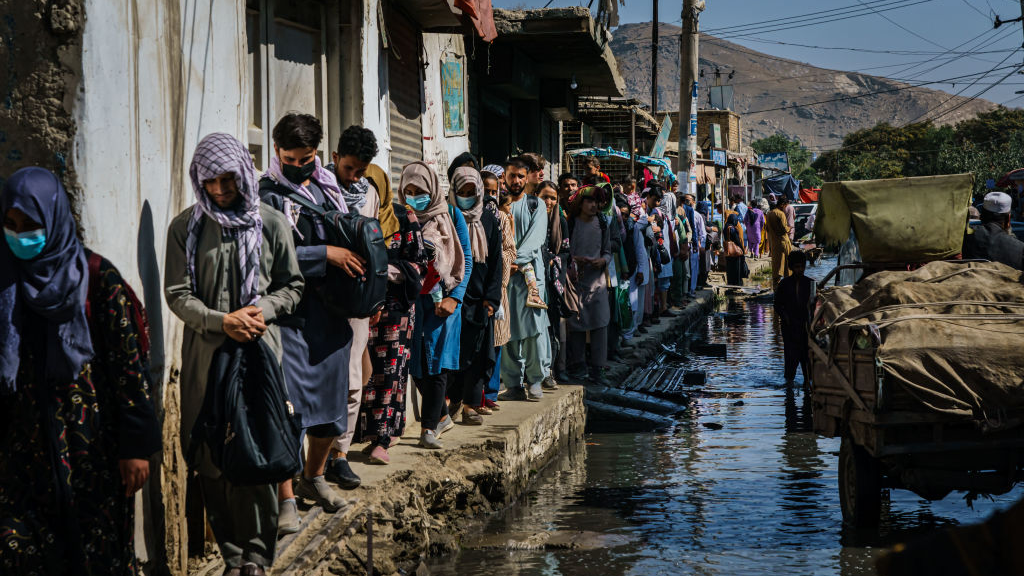Editor's note: Decision Makers is a global platform for influential leaders to share their insights on events shaping today's world. Indrika Ratwatte is Director of the United Nations Refugee Agency Regional Bureau for Asia and the Pacific. This article reflects the author's opinions and not necessarily those of CGTN.
For months, UNHCR, the UN Refugee Agency, and fellow organizations working on the ground have been warning of a humanitarian disaster in Afghanistan and of the further risk of displacement. The warning bells are now ringing louder and clearer than ever.
Afghanistan's economic system is collapsing, its health system is at breaking point, and severe drought continues to grip vast swathes of the country. Over half of Afghanistan's population is facing acute hunger. The situation is especially dire for the 3.4 million people who remain forcibly displaced within the country, of whom 80 percent are women and children.
With the freezing temperatures of a harsh winter, humanitarian response has become more urgent than before. Earlier this week, United Nations agencies launched a plan to respond to critical needs in Afghanistan in 2022, at a cost of $4.4 billion. This sum, the most-ever sought for a single country, will cover emergency needs including protection for the most vulnerable and life-saving support in shelter, food security and health care.
But we cannot forget the Afghans who have previously fled the country and are being generously hosted in neighboring countries. These countries, notably Iran and Pakistan, have hosted over 2.2 million registered refugees and 4 million other Afghans for over 40 years. Despite facing their own challenges, they have pursued inclusive policies towards refugees, particularly in the areas of education and health care. Their generosity cannot be taken for granted; we are therefore requesting $623 million to support Afghan refugees fleeing the current crisis as well as the communities hosting them.

Afghans make their way through a flooded street towards a nearby airport entrance to try their chance at evacuating out of the country, in Kabul, Afghanistan, August 25, 2021. /Getty
Afghans make their way through a flooded street towards a nearby airport entrance to try their chance at evacuating out of the country, in Kabul, Afghanistan, August 25, 2021. /Getty
Over the last year, 140,000 Afghans have sought protection in neighboring countries. Many others have also crossed borders, some compelled to leave by the collapsing economy. In many cases, these vulnerable individuals have had to resort to human trafficking and smuggling networks in a desperate attempt to reach safety. Given the dire humanitarian conditions inside Afghanistan, the risk remains high that increasing numbers may feel compelled to move onwards. UNHCR remains concerned about the risk of human rights violations against civilians – in particular women and girls – in this evolving context.
As we have seen time and time again, in Afghanistan and elsewhere, a humanitarian emergency is never limited to a single country; its effects extend to neighboring countries and beyond, risking destabilization in the wider region.
Together with our partner organizations, UNHCR stayed and delivered in Afghanistan throughout the tumult of 2021 to ensure that its people continued to receive critical humanitarian aid. With the deteriorating humanitarian situation, we are increasingly alarmed by the human suffering we are witnessing on the ground, and which may be yet to come.
We have, nonetheless, seen glimmers of resilience and hopefulness. An estimated 170,000 internally displaced Afghans have returned home since August 2021, buoyed by the fact that many parts of the country are more secure than they were before. As the international community, we must seize on such opportunities to ensure that the hard-earned gains of the last 20 years do not fall away.
Humanitarian aid alone is not enough; it must be accompanied with development assistance in order to bolster the resilience of the Afghan state and its people. Alongside the efforts of the UN and partners to deliver life-saving aid inside Afghanistan, it is critical to maintain focus on eventual solutions. This means continuing robust investments in basic services such as health, education and livelihoods that will benefit all Afghans – including internally displaced people and returnees – and mitigate further displacement.
The Chinese government, companies and people can play an active role in supporting peace and stability through engagement and trade. China has already provided timely and generous deliveries of vital humanitarian aid, including COVID-19 and other medical supplies, food and emergency winter assistance.
UNHCR stands ready to support the Chinese government to ensure that its humanitarian assistance reaches the most vulnerable. As the international community, let us not abandon Afghans in their hour of need, and ensure continued and increased support.
(If you want to contribute and have specific expertise, please contact us at opinions@cgtn.com.)

